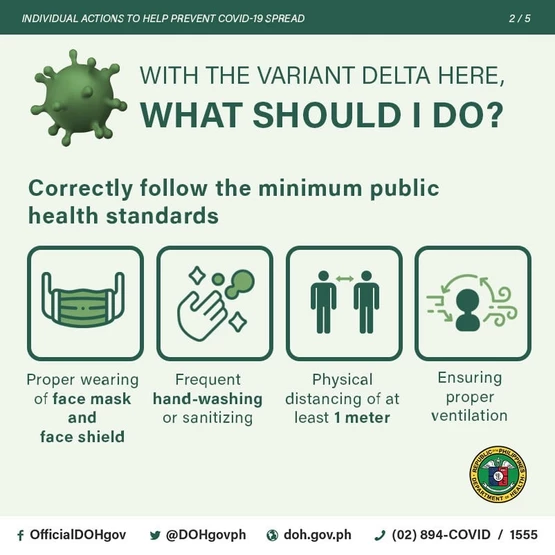Just when we thought that this pandemic was soon to be over because of the different vaccines available now, a new wave around the world begins with a more infectious variant. This variant is the most transmissible variant identified so far, the dominant strain that has caused a wide infection in India which resulted in mass cremations horrifying to see on the news.
Dr. James G. Dy, President and CEO of the Chinese General Hospital and Medical Center, in an article by a local newspaper said that this variant is more contagious, deadlier and difficult to identify. He issued a warning as local cases of infections continue to rise.
What do we really know about the COVID 19 Delta Variant?
Over a month ago in the United States, the Center for Disease Control or CDC released an updated guidance on the urgency of the need to vaccinate the population and a recommendation for wearing masks in public indoor places even for fully vaccinated individuals.
The World Health Organization says that this is a variant of concern that they are monitoring and tracking around the world. Its transmissibility is demonstrated and reported in 96 countries, as of July 5, 2021.
In the Philippines as of August 5, 2021, 16 out of 17 cities in the National Capital Region have the Delta variant cases, according to the Department of Health. The whole country logged its highest number of cases since the start of the pandemic
Infection and Spreading
The Delta variant can cause more infections and spread faster than the earlier forms of SARS-COV-2. Here’s what we need to know more about infection and transmissibility of this variant.
- It is 2x more contagious than previous variants.
- Might cause more severe illness than previous strains in unvaccinated persons.
- The unvaccinated remain the greatest concern.
- Fully vaccinated persons with Delta variant infections can spread the virus to others.
- Vaccinated persons appear to be infectious for a shorter period.
Symptoms
It’s almost impossible to distinguish the Delta variant based on symptoms alone, because they have similar common flu-like symptoms. The Department of Health noted that this variant first detected in India has the same symptoms -headache, sore throat, runny nose and fever. Some patients experience aches and pains, nasal congestion, runny nose, sore throat or diarrhea, and loss of smell and taste.
The mutated Delta variant is more transmissible, evades immunity and lessens antibody neutralizations. It can infect up to 8 people.
Most tests for COVID 19 involve taking a swab sample from the back of the nose, throat or both, like what is done by one type of molecular test for the virus , a real-time polymerase chain reaction (RT-PCR) test. Another test is the Antigen test , a rapid test using a small device that looks like a home pregnancy test.
If you want to schedule a swab test, or know more information about our various Covid-19 tests, visit this page.
What You Can Do
There is a lot we can do as a member of the community to help stop the spread of this infectious variant. With the Delta variant spread all over the world, we need to double down our safety measures.
1. Follow the minimum public health standards correctly which includes proper wearing of face mask and face shield, frequent hand washing or using a sanitizer, maintaining physical distancing of at least 1 meter, ensuring there is proper ventilation.
2. Get vaccinated as soon as you can.
3. Be in the know about what you should do as soon as you see the first signs of COVID19. Isolate yourself and consult with your doctor, or immediately coordinate with your local barangay.
4. Share information responsibly. There is a lot of misinformation spread all over the internet that can cause a lot of confusion. Be prudent in sharing , get your information from reliable sources only.
Vaccines and Availability
COVID-19 vaccines are an important tool in our fight against the pandemic. They are effective, even against the Variants of Concern, which includes the Delta variant, in preventing severe disease, hospitalization, and death.
More than a half billion doses of COVID19 vaccines have been administered in the WHO South East Asia Region. More vaccine doses are becoming available and countries scale up efforts to expand coverage amid recurring surges in cases. In the Philippines, over 13 million people have already received the first of two doses of the COVID-19 vaccine. In contrast, roughly 11.4 million have been fully vaccinated from the virus.
In the Philippines, there are eight vaccines with Emergency Use of Authorization (EUA). These vaccines are safe to use. Their side effects may vary, but they are all effective in protecting the community from getting severely sick or dead.
Available vaccines in the Philippines:
- Gamaleya Sputnik V
- Moderna mRNA-1273
- Pfizer/BioNTech BNT162b2
- Janssen (Johnson & Johnson) Ad26.COV2.S
- Oxford Astra Zeneca AZD1222
- Bharat Biotech Covaxin
- Sinovac CoronaVac
Image Credit: DOH Philippines Facebook Page
Getting vaccinated is still your best protection against the virus and a healthy immune system. Mass vaccination drives are handled by the local government units for now and each has their own vaccine registration systems. If you haven’t been vaccinated, check with your LGU for schedules and procedures. To be fully vaccinated, you need to have two doses of the vaccine. Vaccine supplies are still insufficient at the moment that is why we still do not have the luxury to choose which vaccine to take. Remember that what is available is the best one for you.
Image Credits: straitstimes.com , DOH Philippines Facebook Page
Sources: mb.com.ph, cdc.gov, newsinfo.inquirer.net, statista.comGet vaccinated now and together we can help keep the numbers down and protect ourselves and our loved ones from getting sick. If you think you might be infected and need a swab test, please call our hotline at (02) 8711-4141 local 372/373/379 or send us an SMS / Viber message at +639955442347.




